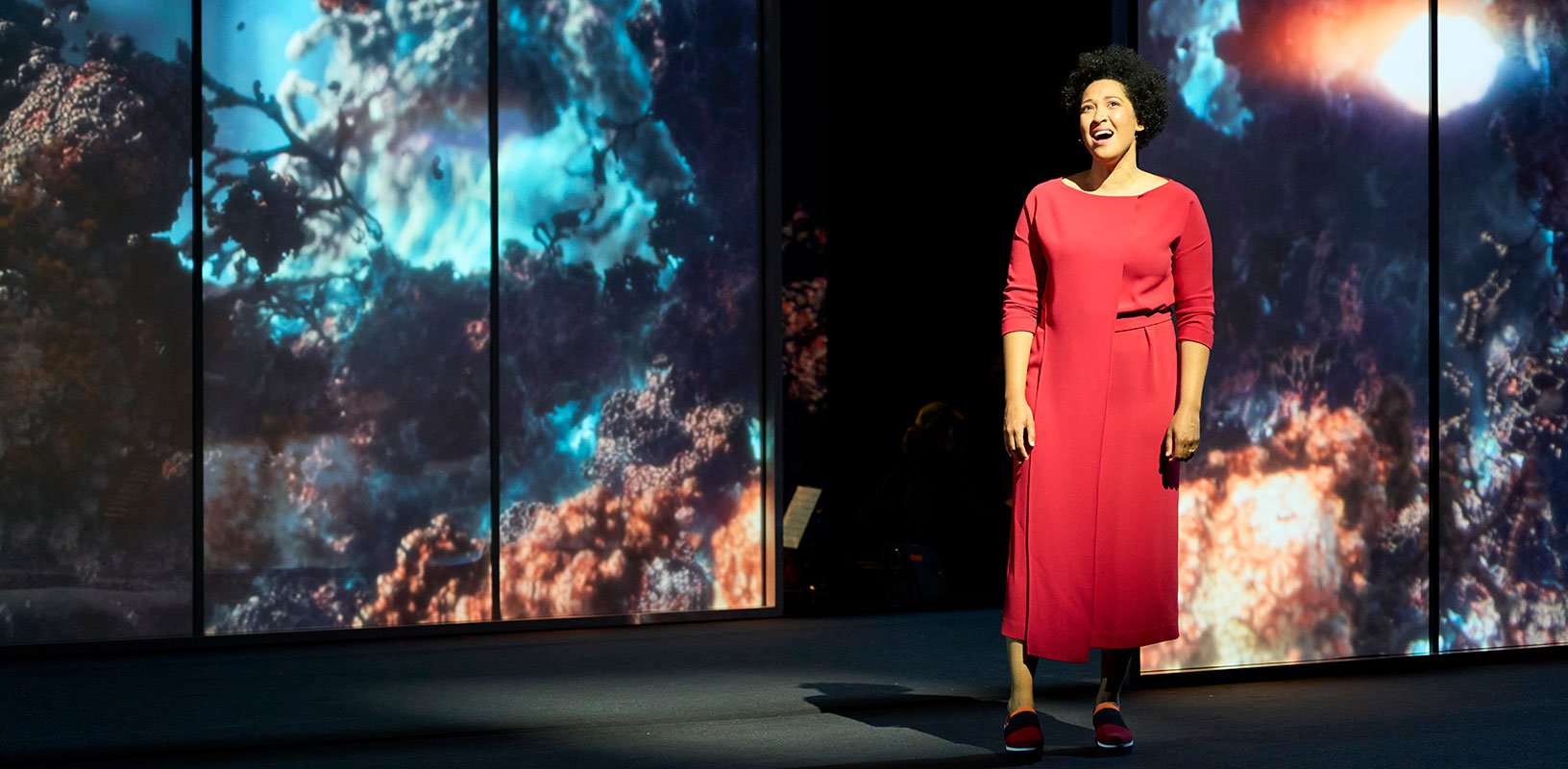OPERA SEARCH
Julia Bullock on Michel van der Aa’s new opera Upload

We sat down with singer Julia Bullock to discuss her role in Michel van der Aa’s new multimedia opera Upload which premiered at Bregenz in July and will tour to other cities in Europe and America.
Upload, the new film opera by Michel van der Aa, drew critical acclaim at its world premiere at the Bregenz Festival in Austria on July 29. The production travels on to Dutch National Opera in October, and Park Avenue Armory New York and Cologne Opera in future seasons.
Internationally renowned soprano Julia Bullock stars in Michel van der Aa’s modern drama centered on a daughter and father (played by Roderick Williams) who struggle to connect after the ailing father decides to upload his conscious mind into a digital version of himself. Bullock spoke with us about her approach to Michel’s music and aesthetic, and the challenging process of learning this new opera about connection and distance, during a pandemic that has kept us all apart.
Can you describe your approach to Michel van der Aa’s aesthetic and his music?
First off, Michel is just a sensitive, patient person. And there is tremendous sensitivity and a level of grace that he demands from the performers in all his music. There’s something pristine that he’s always seeking—it’s in the orchestration and it’s in the vocal line.
The first piece he ever saw me perform was in The Rake’s Progress by Stravinsky. And he told me, “You found a wonderful way to balance the demands of Stravinsky’s music, his architecture, and angular writing, and find the lyricism and throughline.”
In Stravinsky’s music, much like in van der Aa’s, it’s pulling from several different musical sources. He pulls from practically every period of music in The Rake’s Progress. For Michel’s music, he balances between the classical operatic space and popular music space. That is very apparent in the writing, and from Day One of rehearsal it was absolutely necessary to keep that in mind in order to satisfy the delivery he sought after. Michel wants the most direct delivery of his material possible with utmost clarity. He also values utmost balance in a person’s singing voice. So even if there are emotional extremes throughout the opera, that still needed to be translated into my voice with balance and grace. As a singer, I learned a tremendous amount from that, and for the development of the character, it was interesting to have that state of balance be the consistent point of return.
What was it like to learn a new opera during a pandemic?
In many ways, Upload grapples with these moments we have as human beings where we’re not able to connect with each other. That was very much lived out in the rehearsal process because we were in the midst of a lockdown during the pandemic—no physical closeness at all. In the opera, the father and the daughter have no physical connection, because it was severed. How do you build a real relationship?
It was also interesting to work on this piece knowing that we may not go into live performance, so some of the preparations were focused on what could be captured on film. I have a feeling that the breadth of the piece—and even my own expressive palette—is going to expand as we go on with live performances.
What was it like to go from being an opera singer on stage to a film actor in this multimedia opera production?
Well, when I was first falling in love with classical music, I watched a lot of videos of classical singers. I would sometimes even turn the sound off and look at them as I was trying to learn. Most of the time, these great singers I loved looked like they were speaking when they were singing.
Sometimes the most subtle expressions come from just having a thought and allowing myself to listen and be present in the environment, and then letting that register in my body and in my voice. That is enough. With film, it can capture these subtle moments.
In some ways, I always have film in my mind’s eye as I’m preparing a role or for an audio recording, because it’s about specificity. It’s not just, “Oh, that’s lovely sounding.” Every composer has something very specific in mind when they’re writing, and it’s my job to interpret what has been transcribed and to embody it with real focus.
Is there a specific moment in the opera that you find this intimacy captured on film is particularly effective?
At the end of the piece, the daughter is laying in bed with the camera very tight on her. And the father is laying down also. They are not in the same space, they’re not even in the same time. Their minds are somehow on each other and also very much focused on their own experience. There’s this sense of hyper-presence because our faces on film are projected on this massive sail, which look like a blanket, and pours over the audience.
One thing that I always love so much about film and recording is that you feel the presence of the performers with you in the room. In opera, if that wall is broken—and in this case it is, because we performers are literally projected right over your face—that kind of closeness, that sort of intimacy is very arresting. It’s very vulnerable. And I hope that it’s deeply satisfying, because that moment is not about putting on a presentational show. It’s just about being close and connected. And that’s very beautiful.
> Further information on Work: Upload
Photo: Bregenz Festival/Anja Koehler
